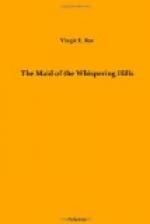“What is it, M’sieu, that so assails the nostrils with delicious aroma, if I may so far forget politeness? ’Tis not beef, assuredly,—there is too much of the scent of the wild about it.”
“Moose,” replied McElroy, and by this time the vague vexation had blown out of his heart as all ill-feelings were wont to do, “moose, killed in the snows and hung in the smoke of a little fire until the very heart of the wood is in the meat. And now, M’sieu, fall to. I would I had something better than Rette’s strong coffee in which to pledge you, but, as you see, Fort de Seviere has no cantine salope. It is not the policy of the Great Company, as you doubtless know, to abet its trade with the Indians by the use of liquor.”
De Courtenay looked quickly up.
“Why, I thought,—but then I have much to learn, in fact, all to learn, since I am but raw in the wilderness.”
Like men hungry and athirst from the hardships of the trail and the stream, the camp and the portage, the guests did justice to the savoury viands, and at last leaned back in repletion, while Rette took off the plates and cups; the spoons and forks, and set in their stead a huge pot of crumbled tobacco with a tin box containing pipes.
“And now,” said the factor, smiling, “let us have talk of that world of which I am hungering for news. You are of the fall ship’s load of new arrivals, I take it?”
“No,” said De Courtenay, “it was last spring, about this time, that I first saw the shores of the New World. Five of my men came with me from across seas and the rest I picked on starting into the wilderness. They are mostly Canadians of Scottish blood. I have a fancy that the strong blond peoples are best for the rigours of what one may find in this country. Though,” he laughed as at some reminiscence, “I have found so far that my two swarthy guides are worth any three of the rest.”
“You have found the way hard?”
“Mother of God! If the rest is like the first of it, I think you may find my bones bleaching beside some portage where I have given up the ghost. Truly do we pay for our whims of caprice, M’sieu.”
“Whims?”
“Aye, what save a whim of the moment could have induced me to undertake so great a hardship as this winning to the Saskatchewan? What save the love of excitement sent me to be, like yourself, the head of a lost trading-post in this far north country?”
The merry blue eyes were full of gaiety and light.
“Truly,—and I pay.”
A whim it might be, yet there was in the spirited face of Alfred de Courtenay that which told plainly that it would be followed to its end, be that what it might, as faithfully as though it were a deeper thing.
For a moment a little line appeared between the straight brows of the factor.
The word of so grave an office mentioned as a “whim,” “a caprice,” went down hard with him. There was nowhere in the heavens above nor the earth below so serious a thing as that same office, and he served it with his whole heart. Therefore he could not quite understand the other. Yet he thought in a moment of De Courtenay’s newness and the frown cleared. Of a very wide tolerance was McElroy.




